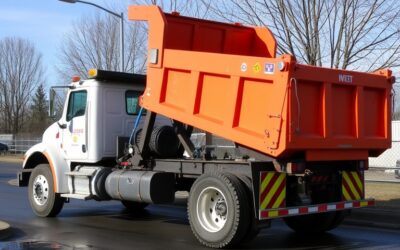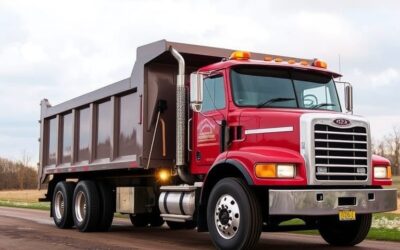Roll-off dump trucks are the backbone of heavy-duty tasks in construction and waste management. But their large loads and high centers of gravity make stability a top concern. Following simple safety steps, paired with technology like anti-tip kits, can dramatically reduce risks and keep operations running smoothly. They transport large loads, making construction and waste management more efficient. However, these trucks can be prone to stability issues, especially when loaded unevenly or operated on rough terrain.
Ensuring the safety of roll off dump trucks involves following several key steps. Proper safety measures help prevent accidents, reduce downtime, and protect both workers and equipment. From daily inspections to safe loading procedures, each step plays a crucial role in maintaining stability.
One vital safety feature for these trucks is the anti-tip kit. This technology helps detect and correct potential tipping situations before they become dangerous. Paired with regular safety checks and mindful driving, anti-tip kits can significantly enhance the operational safety of roll off dump trucks. Let’s explore the unique stability needs, inspections, and techniques that keep these powerful trucks running safely.
Understanding the Unique Stability Needs of Roll Off Dump Trucks
Roll-off dump trucks face unique challenges due to their high center of gravity and shifting loads. Uneven loading or operating on rough terrain increases tipping risks, especially during unloading when the container is raised. These trucks often carry large, bulky containers that can shift during transport. An uneven load can cause the truck to become unstable, increasing the risk of tipping over, especially during turns or on uneven ground.
The high center of gravity in roll off dump trucks also contributes to stability issues. When the container is raised for unloading, the truck becomes more top-heavy. Even small shifts in the load’s weight can make the truck wobble or tip. This potential danger requires operators to be extra cautious during loading and unloading processes.
Operating on inclines or rough terrain further complicates stability. Roll off dump trucks must navigate these conditions without losing balance. Drivers must carefully plan their routes and be aware of the ground conditions at all times. Understanding these unique stability needs is essential for operating roll off dump trucks safely and efficiently. By recognizing these challenges, we can take the necessary steps to prevent accidents and ensure smooth operation.
Pre-Operational Safety Inspections and Protocols
Conducting pre-operational safety inspections is crucial for safe roll off dump truck operations. These inspections help identify potential issues before they become serious problems. Here are some essential steps to include in the inspection process:
1. Check the Tires: Inspect tires for correct inflation and wear. Properly inflated tires are critical for stability, especially with heavy loads. Properly inflated tires are vital for maintaining stability, especially when carrying heavy loads.
2. Examine the Brakes: Test brakes to ensure smooth operation, especially on slopes or during sudden stops. Effective brakes are essential for controlling the truck during stops and turns, especially on slopes.
3. Inspect the Hydraulic System: Inspect the hydraulic system for leaks or damage. A reliable system ensures safe container handling. A well-maintained hydraulic system is crucial for raising and lowering the container safely.
4. Test the Lights and Signals: Ensure all lights and signals work, improving visibility and communication on-site. Properly functioning lights and signals are important for safe driving, especially in low-visibility conditions.
5. Check the Load Securement: Verify that the load is secure and balanced to prevent shifting during transport. An evenly distributed load reduces the risk of tipping and improves overall stability.
Following these pre-operational safety inspections helps ensure that the roll off dump truck is ready for safe operation. By regularly inspecting and maintaining the truck, we can prevent accidents, reduce downtime, and keep the equipment running smoothly.
Safe Loading and Unloading Techniques
Loading and unloading roll off dump trucks require extra care to ensure safety. Improper techniques can lead to accidents and uneven loads, making the truck unstable. Here are some important tips for safe loading and unloading:
1. Even Distribution: Distribute weight evenly across the container to reduce tipping risks and improve handling. Distribute the weight across the entire container to avoid creating a high center of gravity. This practice helps maintain stability during transport.
2. Use Proper Equipment: Use tools like cranes or forklifts for safe, precise loading. Forklifts, cranes, and other tools can help place loads safely and precisely in the container.
3. Secure the Load: Secure the load with straps or chains to prevent shifting and maintain balance. Use straps, chains, or other securing mechanisms to prevent the load from shifting during transit. A secure load minimizes the risk of tipping.
4. Level Ground: Choose level ground for loading and unloading to ensure stability and reduce tipping risks. Uneven ground can make the truck unstable, increasing the chances of tipping.
5. Follow Weight Limits: Adhere to manufacturer weight limits to prevent strain on the truck and enhance stability. Overloading can strain the vehicle and compromise stability, leading to accidents.
By following these safe loading and unloading techniques, we can ensure that roll off dump trucks remain stable and safe to operate. Proper techniques protect not only the equipment but also the personnel involved.
The Role of Anti-Tip Kits in Enhancing Safety
Anti-tip kits are a game-changer for roll-off dump truck safety. With real-time monitoring, automatic adjustments, and driver alerts, these systems actively prevent tipping risks and enhance operational control. These kits provide advanced technology to monitor and correct potential tipping situations. Here’s how they contribute to safer operations:
1. Real-Time Monitoring: Anti-tip kits come equipped with sensors that continuously monitor the truck’s position and load distribution. This real-time data helps in detecting any signs of instability as soon as they occur.
2. Automatic Adjustments: When an imbalance is detected, the anti-tip kit can make automatic adjustments. These adjustments may include lowering the truck bed or redistributing the load to regain stability. This immediate action helps prevent accidents.
3. Driver Alerts: Some anti-tip kits include alert systems that notify the driver of potential tipping hazards. Alerts can be visual or auditory, allowing the driver to take corrective action quickly.
4. Enhanced Control: With the help of anti-tip kits, drivers have better control over the truck’s stability. These kits provide an extra layer of safety, especially when operating in challenging conditions like uneven terrain or during heavy loading and unloading.
By using anti-tip kits, we can significantly reduce the risk of tipping accidents. These kits enhance the overall safety and efficiency of roll off dump trucks, ensuring smoother and safer operations.
Final Thoughts
Operating roll-off dump trucks safely starts with understanding their stability needs and using the right tools. Simple practices like even load distribution, thorough inspections, and advanced tools like anti-tip kits can transform safety and efficiency. Equip your fleet with Wink Anti-Tip to reduce tipping risks and keep operations running smoothly. From ensuring even load distribution to conducting thorough pre-operational inspections, each step plays a vital role in maintaining stability. Safe loading and unloading techniques further enhance safety, preventing accidents and keeping operations smooth.
Anti-tip kits offer an indispensable tool in this safety ensemble. They monitor stability in real-time, provide automatic adjustments, and alert drivers to potential dangers. With these systems in place, drivers can handle their trucks more confidently, knowing that they have an extra layer of protection against tipping hazards.
For comprehensive solutions to roll off dump truck stability issues, consider exploring the benefits of anti-tip kits. They add value through enhanced safety and operational efficiency. Reach out to WINK Anti-Tip today to learn how our advanced anti-tip kits can protect your fleet and improve your operations. Contact us now to ensure your roll off dump trucks stay safe and stable on the job.





